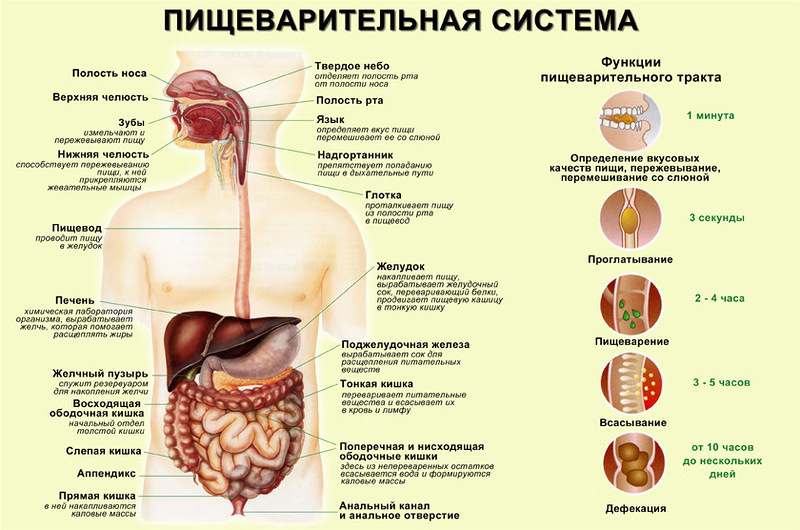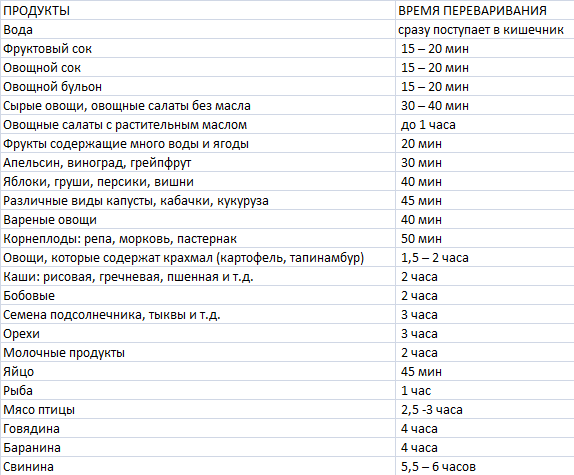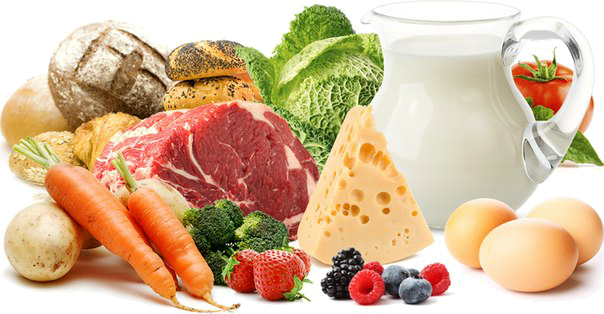Time of digestion of food

As practice shows, not all people are interested in the question of how much food is digested in the stomach.
And, I want to tell you that because of the lack of a clear idea of the importance of this issue, many people, without even noticing themselves, drive their health to a standstill.
The point is that different foods require different "attention" from our digestive system.
What happens to the food after we swallow it? To make food good for the person and give the necessary energy, it must turn into chemical elements, which the body will then absorb into itself. This process begins in the mouth when the saliva dissolves, and the teeth grind food.

Later, in the stomach, it is affected by acid and gastric juices. Coming out of the stomach, food enters the intestine, where it continues to interact with gastric juice. Then it is absorbed through the capillaries into the blood passing through the liver - thousands of enzymes located there neutralize any poison (such as alcohol, for example), while retaining useful iron, vitamins and glucose.
Table of food digestion time in the stomach

Water
If you drink water on an empty stomach, the water immediately passes into the intestine.
Juices and salads
Fruit juices, vegetable juices and broths are digested for 15-20 minutes.
Semi-liquid (wiped salad, vegetables or fruit) 20-30 minutes.
Fruit
Watermelon is digested in 20 minutes.
Melons - 30 minutes.
Oranges, grapefruits, grapes - 30 minutes.
Apples, pears, peaches, cherries and other semi-sweet fruits - 40 minutes.
Vegetables
Mixed salads (vegetables and fruits) are digested for 20 - 30 minutes.
Raw mixed vegetable salads - tomatoes, leaf salad ("romance", Boston, red, leaf, garden), cucumber, celery, green or red pepper, other juicy vegetables digested for 30-40 minutes.
If the lettuce is added lean oil, the time increases to an hour or more.
Vegetables cooked, stewed or steamed
Leafy vegetables - spinach, chicory, cabbage - 40 minutes.
Courgettes, broccoli, cauliflower, green beans, pumpkin, corn on the cob - 45 minutes.
Roots - turnips, carrots, beets, parsnips, turnips, etc. - 50 minutes.
Semi-concentrated carbohydrates - starches
Artichoke, acorn, corn, potatoes, Jerusalem artichoke, yams, chestnuts - 60 minutes.
Starchy food, like cracked rice, buckwheat, millet, cornmeal, oatmeal, quinoa, Metlichka abyssinian, pearl barley, on average, is digested 60-90 minutes.
Concentrated carbohydrates - cereals
Brown rice, millet, buckwheat, corn flakes, oats (the first 3 - best of all) - 90 minutes.
Beans and Legumes (Concentrated carbohydrates and protein, starches and proteins)
Lentils, Lima Beans, chickpeas, peas, beans and beans - 90 min.
Soy beans - 120 minutes.
Nuts and seeds
Seeds - sunflower, pumpkin, pepita, sesame - about 2 hours.
Nuts - almonds, filberts, peanuts (raw), cashews, Brazil nut, walnuts, pecans - 2.5-3 hours.
If the seeds and nuts are soaked in the water for the night, and then crushed, they will quickly assimilate.
Dairy
Skimmed milk, low-fat homemade cheese, ricotta, low-fat cottage cheese or cream cheese for about 90 minutes.
Curd from whole milk - 120 minutes.
Hard cheese from whole milk - 4-5 hours.
Animal proteins
Raw animal proteins are digested in a shorter time than that indicated above for ready / heated animal fats.
Egg yolk - 30 minutes.
Egg (completely) - 45 minutes.
Fish - cod, scrod, flounder, sole seafood - 30 minutes.
Fish - salmon, trout, herring, more fatty fish - 45-60 minutes.
Chicken - 1-2 hours (without skin).
Turkey - 2 hours (without skin).
Beef, lamb - 3-4 hours.
Pork - 4-5 hours.
Categories of food by the time of its digestion in the stomach
More specifically, all food can be divided into 4 categories according to the time of its digestion in our stomach:
- That food that passes quickly (this is, basically, carbohydrate food)
- Average time of assimilation (this is mainly protein food)
- Food is a long-term assimilation (it includes fatty foods and a combination of fatty and protein)
- Excessively long in digestion food and practically not digestible
Now let's describe in more detail everything and structure the received information a little.
The first category includes: almost all fruits (except bananas, avocados and the like), vegetable and fruit juices (not mixed), berries, kefir.
All of the above products do not stay in our stomach for more than 1 hour. For example, fruits pass into the intestines from the stomach after 40 to 45 minutes. In some situations, they can last for 35-40 minutes.
The second category includes: vegetables , greens, dairy products except for cottage cheese and hard cheese, sprouts, nuts and seeds, all dried fruits. All of them get into our intestines in about 1.5 - 2 hours.
The third category includes: cereals and cereals, nuts and seeds, which are not previously soaked in water, cottage cheese and hard cheese, all kinds of mushrooms, beans (if they are boiled), bakery products from flour of higher grades. Their residence time in the stomach is 2 to 3 hours from the time they are taken.
And finally, to group 4 belong: tea with milk, coffee with milk, meat (including poultry, and also fish), pasta (except for those made from whole-grain flour or flour from durum wheat), all types of canned food. All products from the 4 group are very difficult to digest, or are not practically digested at all.
What conclusion can we make now, guided by information on how much food is digested in the stomach?
Everything is very simple:
- If you want your health - you need to eat as many products as you can digest for a short period of time. Thus, you keep your digestive system, and the body spends less energy on its digestion.
- Avoid or eat at least the food that belongs to the 4th category.
- It is not recommended to combine foods and foods that have different digestion times in the stomach.
- If you have problems with the stomach or intestines - eat only food from 1 and 2 categories.
- In the evening, you can eat foods also only from 1 and 2 categories.
Let's look at concrete examples.
How much is cottage cheese digested? To begin with, it is necessary to understand that at lunchtime the digestion is stronger. Accordingly, in order to fully understand: how much is digested cottage cheese - it is also necessary to take into account the time of its use.
For example, if you eat it at lunch - it will already go to the intestine after 2 hours. If you ate it in the morning or in the evening - that time increases to 3 hours and even more (for example, if you ate it at bedtime).
How much is the banana digested? Banana, as we all know, refers to fruits. Accordingly, to answer the question about: how much is digested a banana is very simple. As a fruit - it is already in 45 - 50 minutes completely ready for further processing. If the banana is green - it will be digested for 10 minutes longer than well ripened.
How much is warm food digested? Warm food in the stomach is digested for about 2-3 hours and only then falls into the small intestine, where the stage of cleavage of nutrients from food continues. Two to three hours is the optimal time for digesting food in the stomach and splitting the proteins. This is the norm, since with the ingestion of undigested proteins into the small intestine, the fermentation process begins.
How much is the cold food digested? Cold food in the stomach is digested much faster: the proteins do not have time to digest properly and go straight to the small intestine, the function of which is based on the cleavage and absorption of carbohydrates, since it is in it that the bacteria responsible for this "event" are located.
As a result of ingestion of undigested food in the stomach (proteins) in the small intestine, the proteins, of course, are not normally digested. In addition, bacteria living in meat products (proteins) begin to multiply, which leads to various types of discomfort in the digestive tract (swelling, gases, constipation, etc.).
Golden rules of excellent digestion

In order to be healthy and live for a long time, it is very important to know and take into account the time of digestion of food in the stomach. According to the doctors, a person who, while eating, does not take into account the time of digestion of food, bears kilograms of rotting food, earns a lot of diseases and reduces his life. For good digestion, the following key points should be considered:
- It is absolutely unacceptable to throw into the stomach, like in a "firebox", requiring different time for digesting foods - this you expose it to an additional and unjustified load. For example, a dish of potato with pork will be digested for about 5 - 6 hours, while the separately consumed potatoes are digested and went to the intestine within an hour.
- Optimal mixing of food of one time of digestion (vegetable salad, apples with pears, carrot-beet juice) - this will only slightly stretch the time of food stay in the stomach due to the complexity of selecting enzymes for processing in comparison with mono-nutrition. This version of the "hash" is the most sparing for the body.
- The addition of oils, even in salads, lengthens the time in the stomach 2 - 3 times, due to the effect of food envelopment, and the impossibility of its rational treatment with juices and enzymes.
- You can not drink water, tea and other liquids if there is undigested food in the stomach - this you dilute the gastric juice, complicate the digestion of food and increase the load on the gastrointestinal tract. In addition, along with the liquid in the intestines, undigested products inevitably "slip", which will long rot in it or wander.
- If you drink water on an empty stomach, it immediately passes into the intestine.
- Thoroughly chew food - it also speeds up the digestion process by better grinding and starting processing enzymes in the mouth.
- Use protein foods only in a warm form - warm food in the stomach is digested for about 2-3 hours (which is the optimal time for protein digestion), and only after that it enters the small intestine, where the stage of cleavage of nutrients from food continues.
- Cold food in the stomach is digested much faster, so the proteins do not have time to digest properly and go straight to the small intestine, as a result of which the bacteria in the meat products (proteins) begin to multiply and cause discomfort in the gastrointestinal tract (swelling, gases, constipation etc.)


Comments
When commenting on, remember that the content and tone of your message can hurt the feelings of real people, show respect and tolerance to your interlocutors even if you do not share their opinion, your behavior in the conditions of freedom of expression and anonymity provided by the Internet, changes Not only virtual, but also the real world. All comments are hidden from the index, spam is controlled.